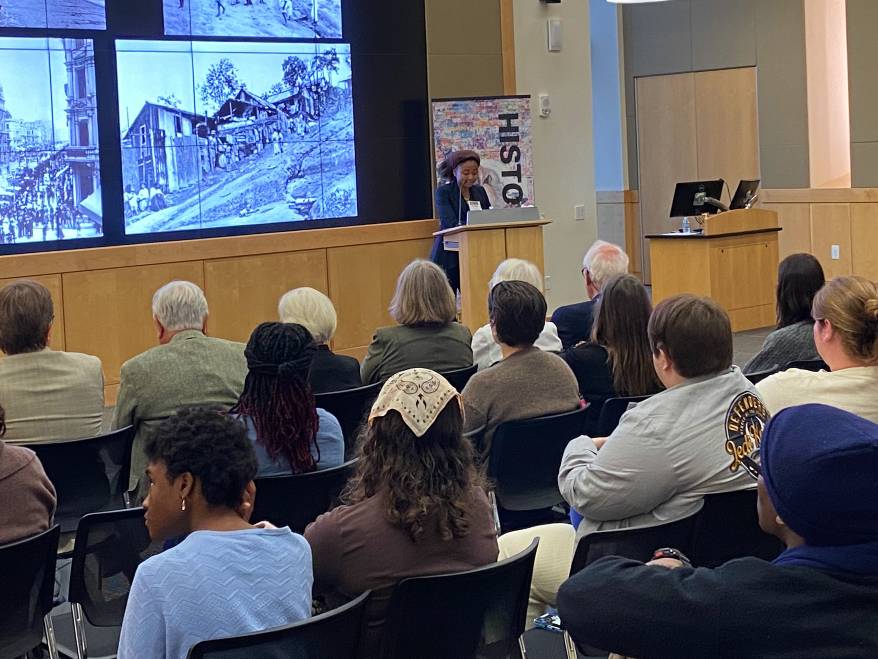Greer Lecture Recap: Psychoanalyzing the Possessed
Oct. 16, 2023

On September 26, VCU History hosted the 5th annual Greer Lecture in Latin American History. This year’s lecture was presented by University of Richmond’s Manuella Meyer, Ph.D. The topic, “Psychoanalyzing the Possessed: Spirits of the Dead in Early Rio de Janeiro, Brazil,” provided attendees with an educational exploration about early psychiatry and spiritism in Rio during the late nineteenth and early twentieth centuries.
We learned that in early Brazil, there was significant conflict between psychiatry and spiritist religions, particularly Candomblé and Kardecism. When slaves were brought to Brazil, they were forced to convert to Roman Catholicism and suppress their native beliefs and culture. Eventually, the slaves merged Catholicism with their own traditions and created their own syncretised religion, Candomblé. Kardecism began in France by Allan Kardec and made its way to Brazil by way of French immigrants.
The two spiritualities gained popularity in a more urban population of Afro-Brazilians and other poor communities. Unfortunately, the two religions were heavily disliked by psychiatrists, scientists, state officials and elites who saw them as disruptive to the social order. They were seen as fraudulent and harmful to mental health. Candomblé was often described as “primitive” and a “lower form of spiritism.” Due to this pessimistic view, Brazil underwent a “whitening project,” Meyer said.
Candomblé and Kardecism were not protected under freedom of religion, and many efforts were made by psychiatrists, elites and state officials to suppress and discredit them. These religions were classified as “diseases” and pitted against each other, though psychiatry was their main enemy. Three articles were added to Brazil’s penal code that made practices and traditions within spiritism as well as spiritism itself illegal. Meyer explained the reality of the situation, saying that state officials were “very much curtailing the role of healers practicing their arts in whatever way they could.”
Despite the tension between all three parties, psychiatrists, in particular, found what Meyer called an “escape route”: Freudian psychoanalysis. This was seen by psychiatrists as a tool for regeneration of the population, reframing the issues they had, and for general common ground. Psychoanalysis essentially defended and destigmatized the “primitiveness” of the spiritualities, arguing that primitiveness was natural, and neither good nor bad.
Spiritism began to make more headway in the 1930s when Brazilian president Getúlio Vargas came to power. He enacted a law that protected spiritist religions, granting them autonomy, social integration, and legitimacy. The only stipulation was that these religions had to be registered with and regulated by the state. Despite uneven popularity, both Kardecism and Candomblé continued to thrive and gain popularity. Meyer commented on the resistance that these spiritualities exhibited, “We see that detailed history and experiential realities of Candomblé healers who revealed a refusal to die a slow social death of abjection before the state.”
Meyer provided the audience new insight and perspective on the topic of religion, psychiatry and spirituality in Brazil. She notes on the struggle between psychiatry and spirituality, “like their colleagues elsewhere, Brazilian mental health professionals have long bemoaned the appeal of alternative healers, from priests and spiritists. In the face of professional competition they have struggled to accommodate a question of faith.”
Discussions with attendees post-lecture showed an agreement that it is important to highlight the significance of such topics in understanding the richness of global history. There was particular interest in Candomblé healers and the legalization and recognition of these two spiritualities. The history of Kardecism and Candomblé can be easily made parallel with struggles faced by other religious and spiritual movements throughout history worldwide.
VCU president of the Alexandrian Society Biruk Yirgem stated, “I appreciate how accessible the lecture was, Dr. Meyer explained something that most people aren’t aware of in a very understandable way.”
Vice president of the Alexandrian Society at VCU, Aissatou Ndao also commented on the lecture, “I thoroughly enjoyed learning about the legalization of spiritism, as well as the thread that it has to western religions and spiritualities.”
Listeners appreciated the research she conducted on this relatively obscure topic. Meyer recognized the importance of preserving cultural diversity and disseminating information on niche topics. “Stories of the fantastic often thrive on the edges of the discourses of the real,” Meyer concluded.
We are grateful to Professor Meyer for providing the 2023 Greer Lecture in Latin American History, and her fresh perspective on the intersections of religion, psychiatry and spirituality in Brazil.